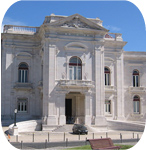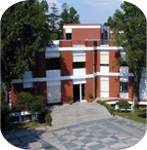Associate Laboratory
 |
The concept of Laboratório Associado was introduced in 1999 by the Ministry of Science and Technology, as a status attributable to a research institution of recognized value upon evaluation. The status of Laboratório Associado was attributed for the first time in November 2000 to four institutions classified as excellent by an international board of scientists, in accordance with international quality criteria. The first Laboratório Associados in Portugal were Centro de Neurociências de Coimbra (CNC), Instituto de Biologia Molecular e Celular (IBMC), Instituto de patologia e Imunologia Molecular (IPATIMUP) e Instituto de Tecnologia Química e Biológica (ITQB). The LA-ITQB was an association between the ITQB, the Gulbenkian Institute of Science (IGC) and the Institute for Experimental Biology and Technology (IBET). The contract between the Fundação para a Ciência e a Tecnologia and the Instituto de Tecnologia Química e Biológica for the formation of the Laboratório Associado was signed in 2000, but the first scientific staff was only appointed in July 2001. The contract was signed for ten years with an evaluation step halfway through this period. In 2011, the LA-ITQB was extended to a larger consortium, involving the Instituto de Tecnologia Química e Biológia (ITQB-UNL), the Instituto Gulbenkian de Ciência (IGC), the Instituto de Biologia Experimental e Tecnológica (IBET) and the Centro de Estudos de Doenças Crónicas (CEDOC-UNL). The partnership between these instituions is still maintained today and together they cover a broad scientific expertise, spanning from Chemistry to Medicine, i.e., from “the molecule to the clinical”. |
|
ITQB | ||
| Instituto de Tecnologia Química e Biológica (ITQB) is a research and advanced training institute of Universidade Nova de Lisboa. Its mission is to carry out scientific research and postgraduate teaching in chemistry, life sciences, and associated technologies, while also serving the community and performing university extension activities for the promotion of science and technology. ITQB’s highly multidisciplinary nature makes it a leading centre for advanced training of researchers in Portugal. | |
IGC | ||
| Supported by the Calouste Gulbenkian Foundation, IGC 's activities are focused on biomedical research, particularly those related to the genetic basis of development and evolution of complexe systems, namely, Developmental Biology and Evolution, Genetic Susceptibility of Complex Diseases (diabetes, lupus and autism) and Infections, Molecular and Cellular Mechanisms of Response to Stress, Control of Cellular Cycle and Genetic Expression, Immunity Tolerance and the development of new Strategic Vaccines. Go to IGC | |
IBET | ||
| Situated in the same building of ITQB, IBET is a private non-profit organisation. It is a platform for University-Industry collaboration in the area of Biotechnology. Its pilot plant infra-structure is certified as "current Good Manufacturing Practices" and three of its services are certified "Good Laboratory Practices". These constitute a unique group at the national level. IBET has a long track-record of collaborative Research and Development in areas such as Biopharmaceutical Products, Vaccine Development, Medical and Veterinarian Diagnosis, Production of purified protein for research of Structure-Function relationships, Starter Cultures of Micro-organisms, and Supercritical Fluid Extraction. IBET also has an important role as a base for start-up companies. Go to IBET | |
CEDOC | ||
 | The CEDOC is a Research Centre established in 2007 which aims at excellence in medical research on chronic diseases. It is divided into three main research groups: Biomedical and Translational Research; Clinical Research; and Epidemiology, Health Policy and Services. Laboratories are located at the main campus of Campo Santana in central Lisbon, as well as at both hospitals associated to the medical faculty (FCM-UNL) and a newly refurbished space at the Instituto Gulbenkian de Ciência campus. Go to CEDOC | |
 | The Associate Laboratory was financially supported by Fundação para a Ciência e a Tecnologia |










